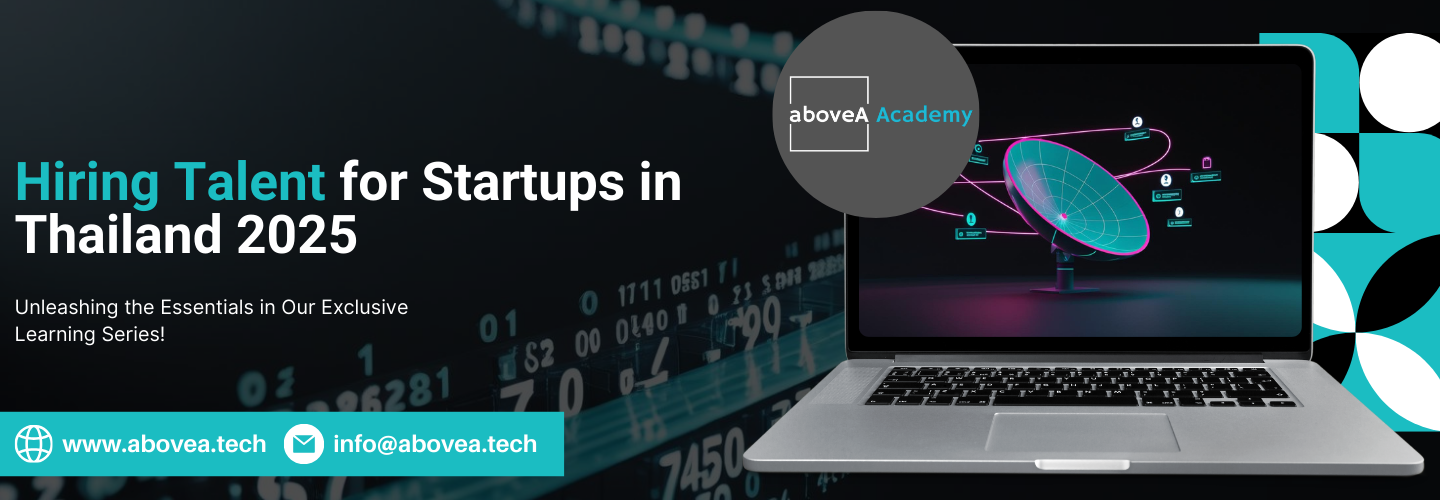

Austeja Norvaisaite
Growth hacker and strategic partnership coordinator. Passionate about blending creativity with data-driven insights to craft accessible, resonant content for diverse audiences.
Hiring Talent for Your Startup in Thailand: What Founders Need to Know
Hiring talent for your startup in Thailand is one of the most critical steps for scaling in 2025. Founders face unique challenges, including navigating labor laws, balancing salaries, and addressing culture and skill shortages. Thailand’s growing startup ecosystem makes attracting top talent both competitive and rewarding.
This article will break down everything you need to know about hiring in Thailand – from average salary expectations to recruitment strategies, legal compliance, and cultural considerations. By the end, you’ll understand how to build a team that fits your vision, scales with growth, and helps you compete globally.
We help Thai startups craft an employer brand that attracts people who believe in your mission — and stay long-term.
Table of Contents
Why Hiring in Thailand is Different for Startups?
Hiring in Thailand for startups is unique compared to other Asian markets. Bangkok offers a large pool of professionals in tech, marketing, and finance, but competition with corporates and multinationals pushes salaries higher. In Chiang Mai, costs are lower and talent is more remote-friendly, though advanced skills are harder to find.
Work culture also matters. Thai employees often value stability, teamwork, and respectful communication, while startups thrive on agility and risk-taking. Founders must balance these differences. On top of that, labor laws in Thailand require careful compliance with contracts, probation, and benefits. For startups in 2025, hiring success depends on combining cultural awareness, competitive offers, and smart recruitment strategies that fit both budget and long-term goals.
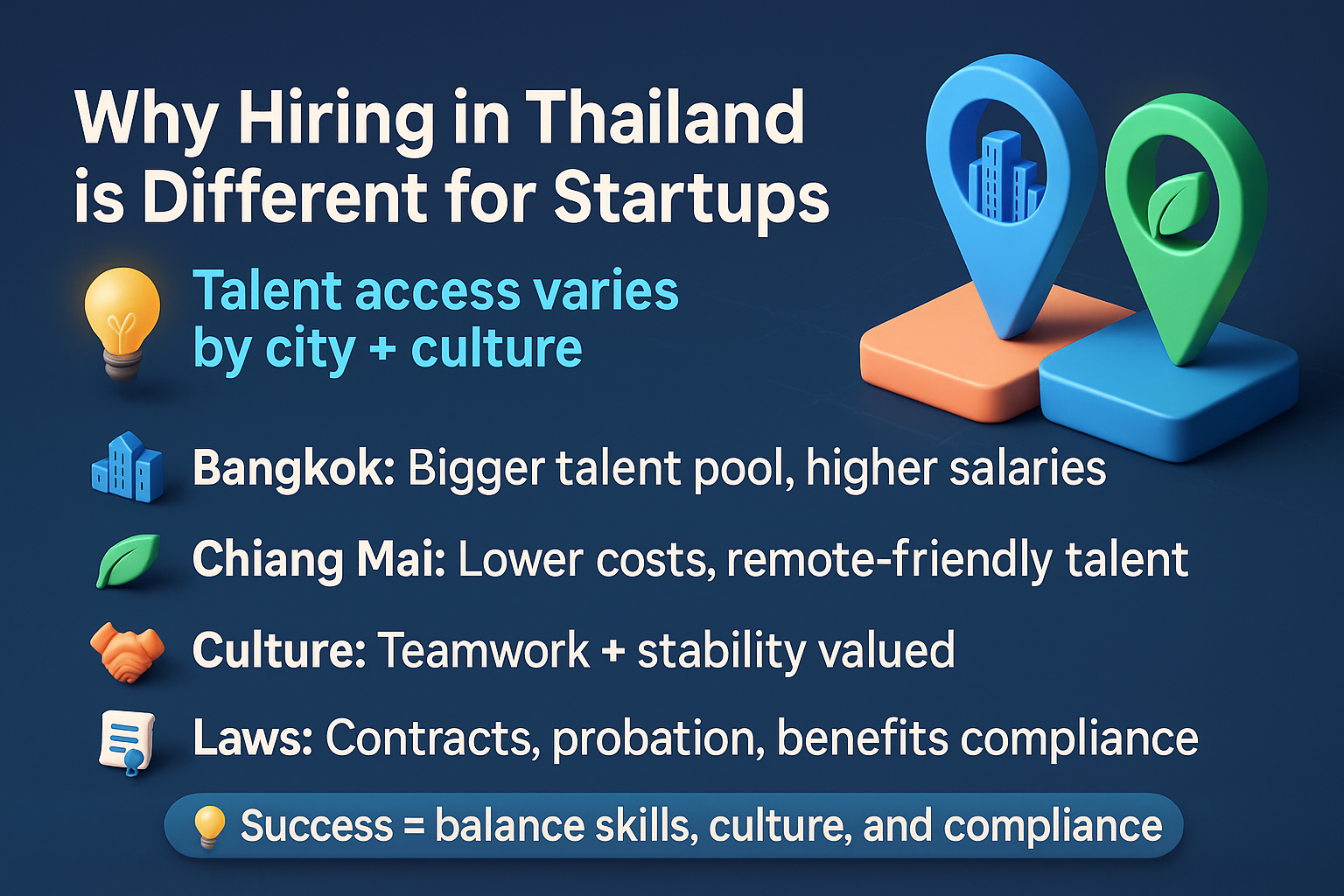
Salary Expectations in Thailand’s Startup Market
Startup salaries in Thailand in 2025 are shaped by role type, industry, and location. Founders need to understand not just raw numbers, but also how costs differ between Bangkok and Chiang Mai. This chapter explores salary ranges, regional differences, and provides a detailed comparison table to guide smarter hiring decisions for growing startups.
Salary Ranges Across Roles and Locations
Startup salaries in Thailand vary widely depending on role, experience, and location. In Bangkok, salaries are naturally higher due to competition with corporates and international firms. Entry-level marketing assistants or sales staff often earn between ฿25,000–฿35,000 per month, while more specialized roles like software developers or data analysts typically command ฿60,000–฿100,000 per month. Senior engineers and product managers can even surpass ฿120,000 monthly if they bring niche expertise in fintech, AI, or cybersecurity.
Outside Bangkok, especially in Chiang Mai and secondary cities, salaries tend to be 20–30% lower. However, startups benefit from reduced costs and still attract skilled employees, particularly digital nomads and remote workers. Many early-stage founders in 2025 use a hybrid hiring model – placing high-value strategic roles in Bangkok while filling support or creative roles in Chiang Mai. This balance helps stretch runway while maintaining access to top-tier talent. Startups that position themselves as growth-focused and offer career advancement often successfully attract ambitious talent even if they can’t match corporate salaries.
Average Salaries by Role in 2025
To give founders a clearer view, here’s a breakdown of average monthly salaries for startup roles in Thailand (2025):
| Role | Bangkok Avg. Salary (THB) | Chiang Mai Avg. Salary (THB) | Notes |
|---|---|---|---|
| Marketing Executive | ฿30,000–฿40,000 | ฿22,000–฿28,000 | Strong demand for digital marketing skills. |
| Sales Representative | ฿28,000–฿35,000 | ฿20,000–฿26,000 | Commission structures often add 20–30%. |
| Software Developer | ฿70,000–฿100,000 | ฿50,000–฿75,000 | Higher for AI/fintech developers. |
| UI/UX Designer | ฿45,000–฿65,000 | ฿32,000–฿48,000 | Creative roles thrive in Chiang Mai. |
| Data Analyst | ฿60,000–฿85,000 | ฿40,000–฿60,000 | Demand rising with startup analytics needs. |
| Product Manager | ฿90,000–฿120,000 | ฿65,000–฿90,000 | High-level role, often recruited from corporates. |
| Customer Support | ฿25,000–฿32,000 | ฿18,000–฿24,000 | Remote-friendly role, often outsourced. |
| HR / Talent Specialist | ฿40,000–฿60,000 | ฿28,000–฿42,000 | Key for scaling startups quickly. |
This table highlights that Bangkok offers broader expertise but at a premium, while Chiang Mai is leaner and better for cost-sensitive hiring. Startups choosing the right balance between cost, talent availability, and cultural fit will secure stronger teams without overspending in 2025.
Recruitment Channels and Hiring Strategies for Startups in Thailand
Recruitment for startups in Thailand requires a different approach than large corporations. Startups must be resourceful, balancing costs with access to the right talent pool. Traditional job boards and word-of-mouth alone aren’t enough in 2025, where competition for skilled professionals is high across Bangkok, Chiang Mai, and emerging hubs.
The most effective strategies mix digital hiring platforms, networking events, and community-driven outreach. Online portals like JobsDB, LinkedIn, and Thai Job Network remain popular for mainstream roles. However, startups looking for developers, marketers, or designers increasingly turn to niche communities, co-working spaces, and social media groups where young professionals actively seek growth-focused companies.
To attract talent, founders should combine:
Online recruitment platforms for visibility and speed.
Startup and tech events in Bangkok for direct engagement with talent.
University partnerships in Thailand to tap into emerging graduates.
Co-working hubs in Chiang Mai where digital nomads and freelancers gather.
Referral programs that reward existing employees for recommending candidates.
Unlike corporates, startups must sell their vision and culture just as much as job security. Candidates in 2025 are more open to flexible working arrangements, hybrid setups, and equity options, which can make a smaller company competitive against larger players.
Another rising strategy is employer branding. Showcasing a startup’s mission, growth opportunities, and founder-led leadership on platforms like LinkedIn or Glassdoor helps establish credibility. Thai candidates increasingly research company culture before applying, making transparency a critical edge.
In short, the smartest startups in Thailand combine digital recruiting channels with community-based outreach, while reinforcing their value proposition. This hybrid approach gives founders access to talent pools that corporates often overlook, helping secure the right team without overspending.
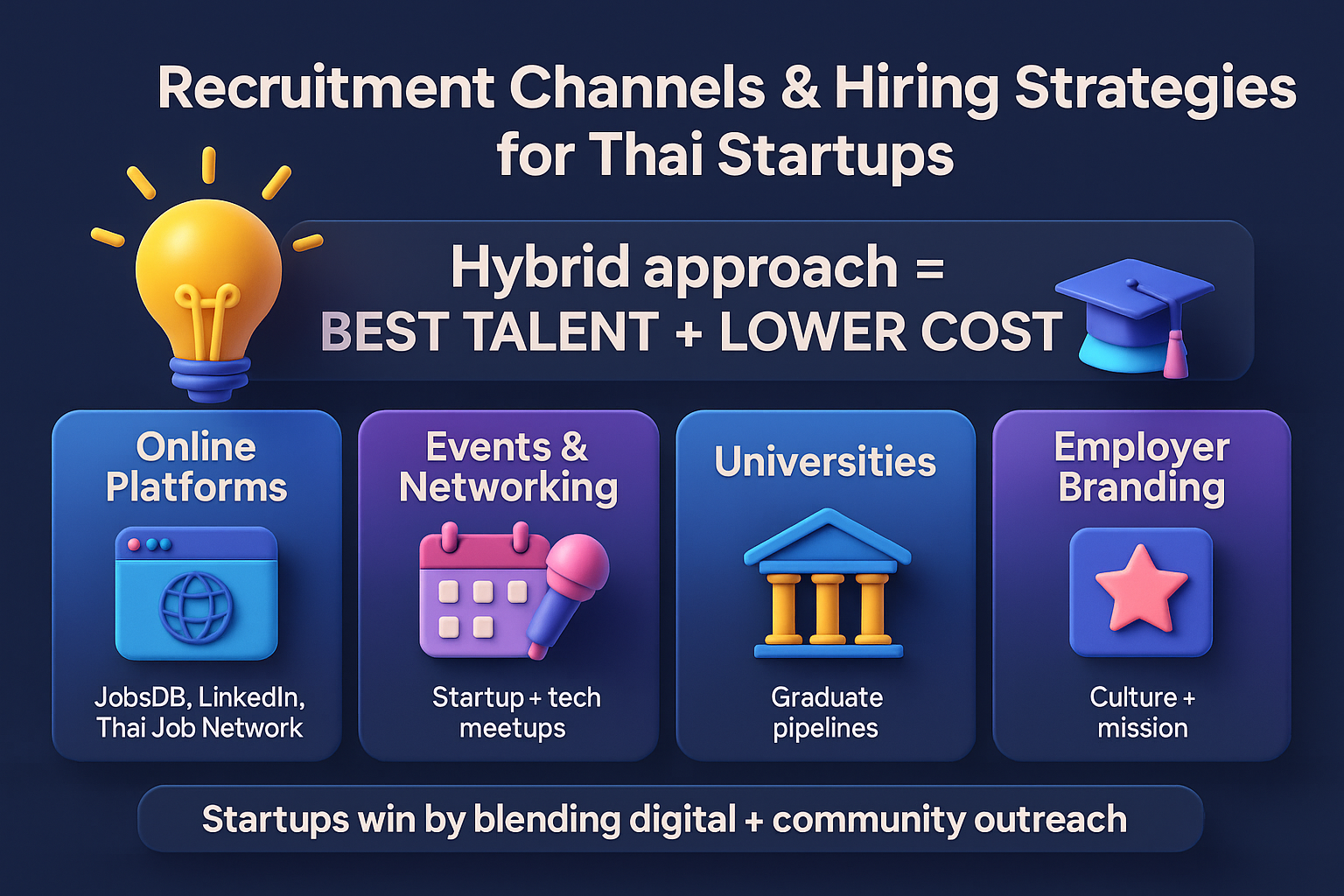
Legal Considerations and Compliance When Hiring in Thailand
Hiring employees in Thailand comes with critical legal responsibilities that every startup founder must understand. Labor law in Thailand is strict, and mistakes in contracts or benefits can result in fines or disputes. Unlike freelancers or contractors, employees are protected under the Thai Labor Protection Act, which outlines working hours, leave policies, and termination rules.
The first step is to ensure that you issue a written employment contract. While verbal agreements are technically valid, startups are strongly advised to formalize contracts that clearly define salary, probation periods, benefits, and notice terms. Probation usually lasts up to 119 days, after which employees gain additional protections.
Employers must also register workers with Social Security. In 2025, contributions remain at 5% of salary (capped at ฿750 per month), shared between employer and employee. This provides health coverage, unemployment benefits, and pensions, which are mandatory for all Thai hires.
Foreign hires require additional steps. Startups must secure work permits and visas, which demand proof of capital and minimum local-to-foreign staff ratios. Many early-stage startups in Bangkok and Chiang Mai choose to work with Employer of Record (EOR) services to simplify compliance and reduce administrative risk.
Another critical compliance factor is taxation. Employers must withhold personal income tax (PIT) at source and submit monthly returns. Failure to do so can result in heavy penalties.
For startups in Thailand, legal compliance is not just about avoiding fines — it’s also about building trust with employees. Workers who feel protected under fair contracts and benefits are more loyal, which directly impacts retention in a competitive market.
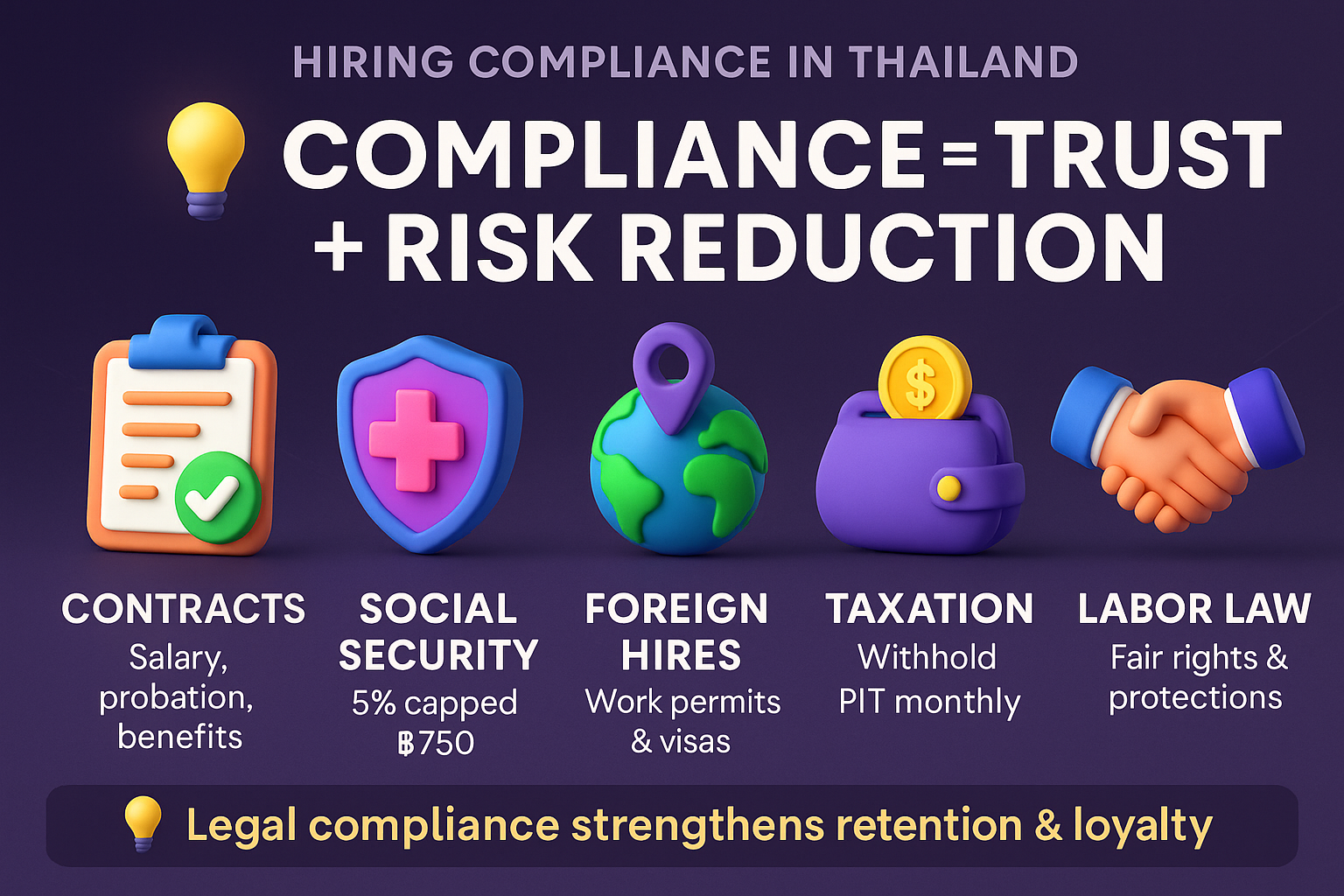
Building a Strong Employer Brand in Thailand
Employer branding for startups in Thailand is one of the most powerful ways to attract top talent in 2025. With multinational companies offering higher salaries, startups must stand out by showcasing their vision, culture, and growth opportunities. A strong employer brand not only attracts candidates but also helps retain them in competitive markets like Bangkok and Chiang Mai.
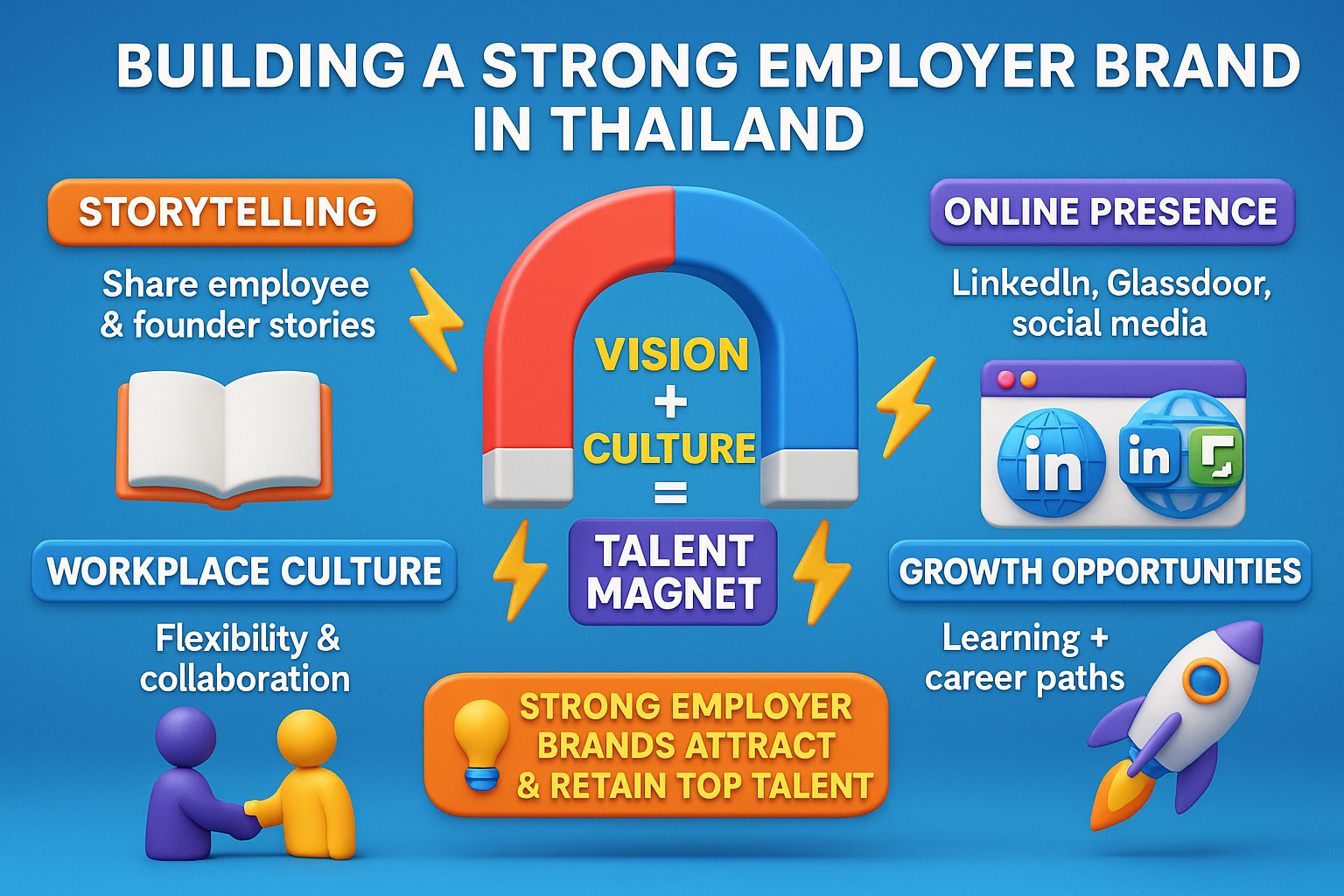
Candidates in Thailand increasingly research potential employers on LinkedIn, Glassdoor, and social media before applying. Startups that highlight employee stories, founder values, and workplace flexibility are more likely to appeal to ambitious professionals seeking meaningful careers.
Key Employer Branding Strategies for Startups
Showcase startup culture online – Share team photos, behind-the-scenes videos, and stories on LinkedIn or Facebook.
Offer career growth opportunities – Emphasize mentorship, skill development, and clear promotion paths.
Highlight work flexibility – Hybrid or remote options are major advantages for Thai talent in 2025.
Encourage employee advocacy – Happy employees sharing positive experiences boosts credibility faster than ads.
Be transparent about vision – Thai professionals want to know how their work contributes to long-term goals.
A unique edge for startups is offering equity or performance-based incentives. While corporates rely on salaries and benefits, early-stage ventures can attract risk-tolerant talent by tying rewards to company success.
In Chiang Mai, employer branding often focuses on lifestyle benefits – lower cost of living, work-life balance, and strong creative communities. In Bangkok, it’s about career acceleration and exposure to fast-paced industries like fintech, AI, and e-commerce. Startups that invest in employer branding position themselves as desirable workplaces despite budget limits, creating a talent pipeline that supports growth for years ahead.
Remote and Hybrid Work Models in Thailand’s Startup Scene
Remote work in Thailand’s startup ecosystem has grown rapidly since the pandemic, and in 2025, it continues to shape how founders attract and manage talent. For early-stage ventures, offering hybrid or fully remote roles is more than a perk – it’s a competitive advantage when competing with corporates that demand strict office attendance.
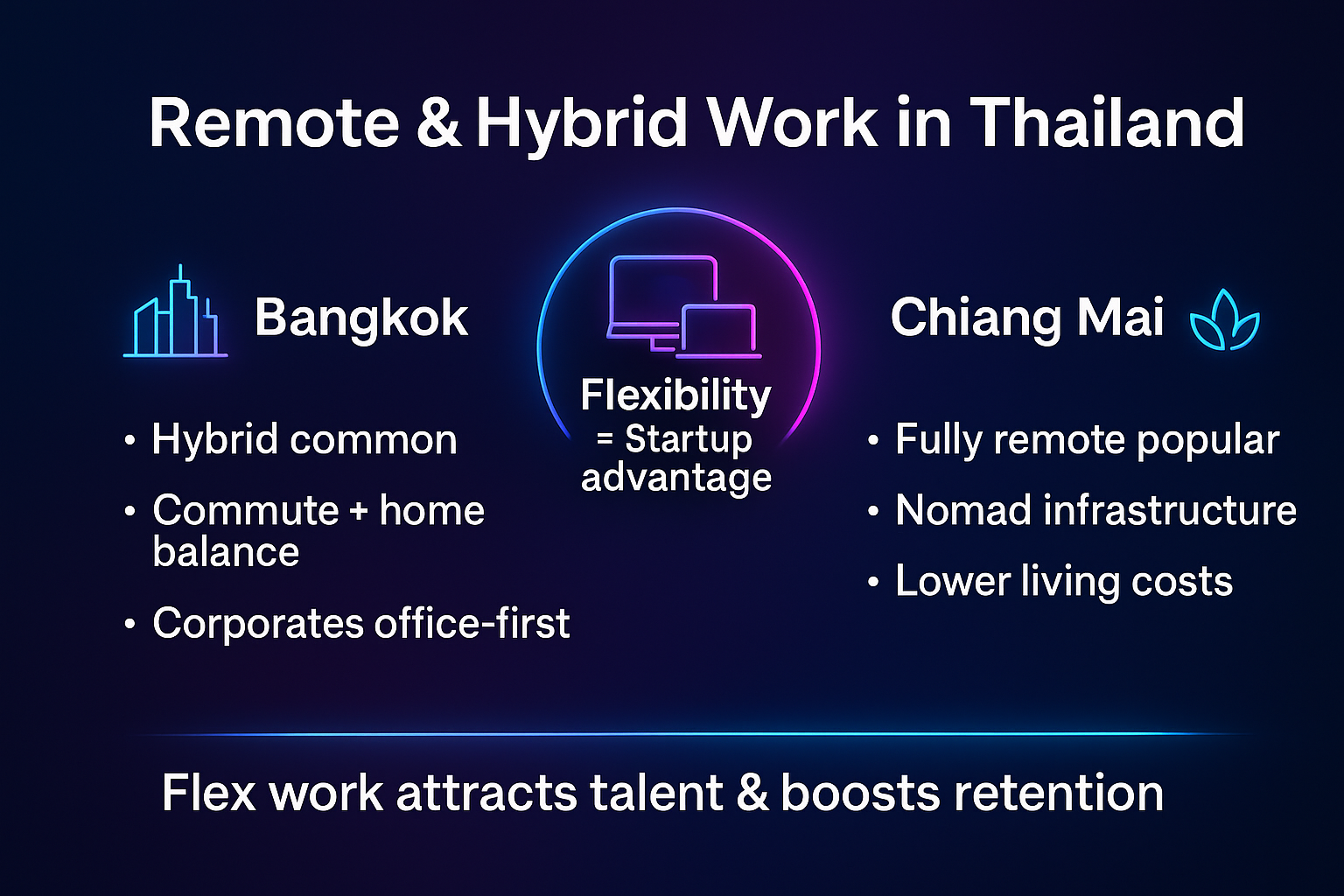
Thai professionals, especially younger generations, increasingly expect flexibility in work arrangements. In Bangkok, hybrid models are the most common, allowing employees to balance commuting with home-based productivity. In Chiang Mai, many startups lean toward fully remote setups, supported by the city’s digital nomad infrastructure and lower living costs.
Advantages of Remote and Hybrid Models for Startups
Wider talent pool access – Founders can hire professionals from across Thailand or even neighboring ASEAN countries.
Cost efficiency – Reduced need for large office spaces lowers overhead, freeing budgets for growth initiatives.
Employee satisfaction – Flexible models boost retention, especially among younger talent prioritizing work-life balance.
Scalable hiring – Startups can scale teams faster without being limited by physical office capacity.
Global collaboration – Remote-friendly operations prepare Thai startups for international expansion.
For startups, the key is balancing flexibility with accountability. Many use project management tools like Asana, Trello, or Notion, alongside Slack or LINE for communication. Daily check-ins and transparent goal-setting keep teams aligned, ensuring productivity isn’t lost in remote setups.
The Thai government has also introduced new discussions on digital nomad visas and long-term work permits in 2025, which could make Thailand even more attractive for global talent. Startups that embrace hybrid and remote work now will find themselves better positioned to scale and attract top professionals.
Challenges Startups Face When Hiring in Thailand
Hiring talent in Thailand’s startup ecosystem brings many opportunities, but founders also face unique obstacles compared to larger corporations. These challenges can slow down recruitment, increase costs, or even impact company culture if not managed well. Below are the most common hurdles startups encounter in 2025.
High Competition for Skilled Talent
Bangkok’s startup scene is thriving, especially in sectors like fintech, e-commerce, and AI. However, this growth has led to intense competition for skilled workers. Multinational corporations often lure candidates with higher salaries and benefits, making it difficult for early-stage startups to stand out.
Limited Specialized Talent Outside Bangkok
Chiang Mai and secondary cities offer cost savings, but specialized roles, such as data science, growth marketing, and advanced software engineering, are more challenging to fill outside the capital. Startups in smaller hubs often rely on freelancers or remote talent to bridge gaps.
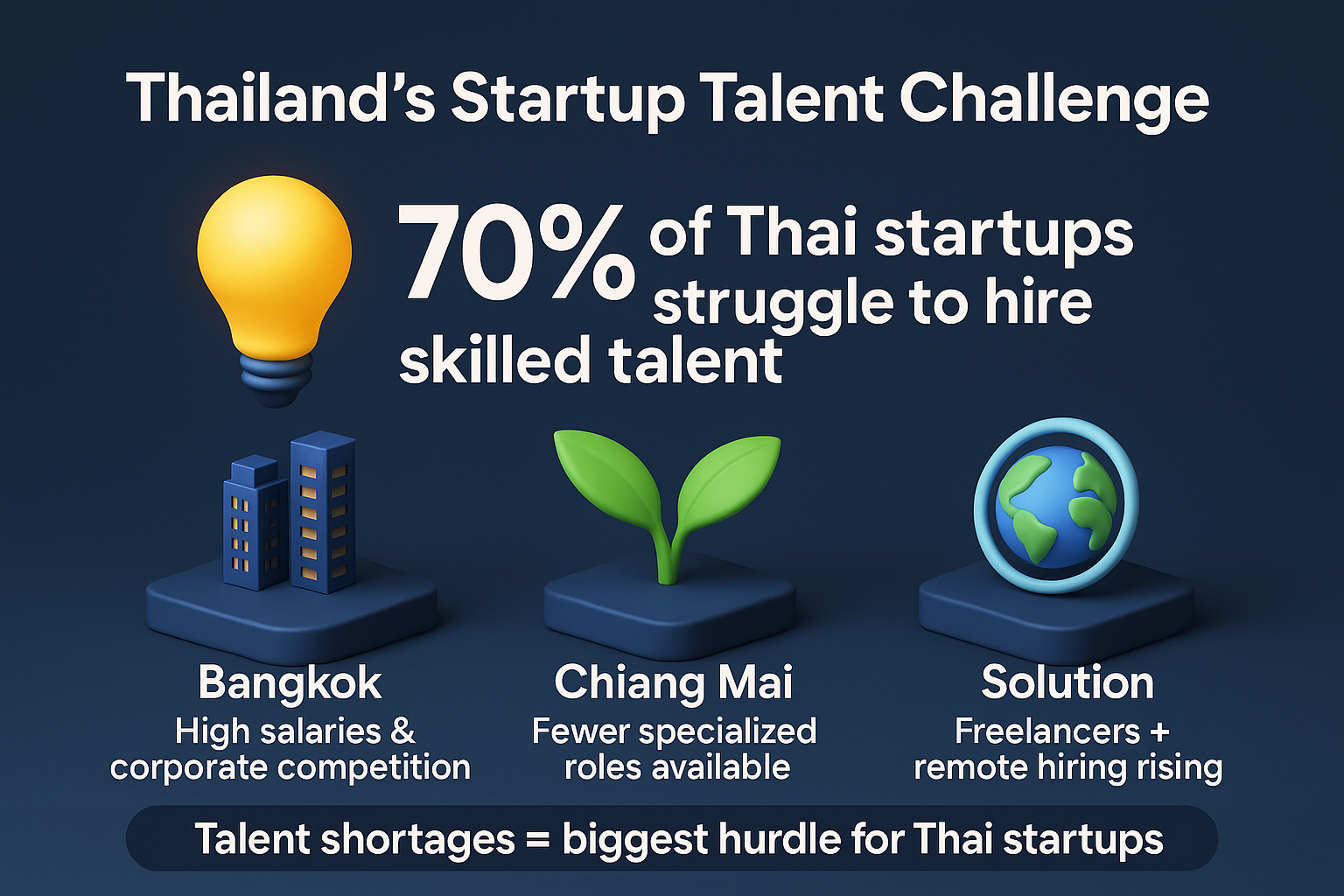
Salary Pressures and Rising Expectations
In 2025, Thai professionals expect not only competitive pay but also flexibility, wellness benefits, and career growth opportunities. For startups with limited funding, balancing these expectations against lean budgets is a constant challenge. Misalignment here often results in high turnover.
Navigating Legal and Compliance Barriers
Thailand’s labor laws are strict, requiring contracts, social security contributions, and tax compliance. Startups that lack HR infrastructure risk penalties or employee disputes. Hiring foreign talent adds complexity, with visa and work permit requirements creating delays or added costs for founders.
How Startups Can Overcome Hiring Challenges in Thailand?
While hiring in Thailand’s startup ecosystem presents difficulties, founders can overcome these barriers with the right strategies. By adapting recruitment methods and leveraging local resources, startups can compete effectively against larger employers.
Leveraging Local Networks and Employer Branding
Startups in Thailand can overcome talent shortages by tapping into local networks, incubators, and university partnerships. Engaging with career fairs at top universities like Chulalongkorn or Chiang Mai University helps reach young professionals before corporations recruit them.
Employer branding also plays a crucial role. By showcasing company culture, growth opportunities, and flexible work models on LinkedIn and Thai job boards, startups create a competitive edge. Unlike corporates, startups can promote faster career growth and closer collaboration with founders – elements that strongly attract ambitious talent.
Smart Benefits, Remote Options, and Compliance Support
Competing on salary alone is tough, but startups can provide creative benefits such as flexible hours, equity incentives, or learning stipends. In 2025, work-life balance is a top priority for Thai professionals, making hybrid and remote models a strong selling point.
For legal and compliance challenges, startups can partner with Employer of Record (EOR) providers or use HR tech platforms to manage payroll, contracts, and social security obligations. This ensures smooth hiring without the overhead of building a whole HR department.
By focusing on smart incentives, strong branding, and compliance solutions, startups in Thailand can build sustainable teams while maintaining lean operations. These practices not only reduce hiring risks but also create long-term loyalty from employees who value meaningful growth over corporate perks.
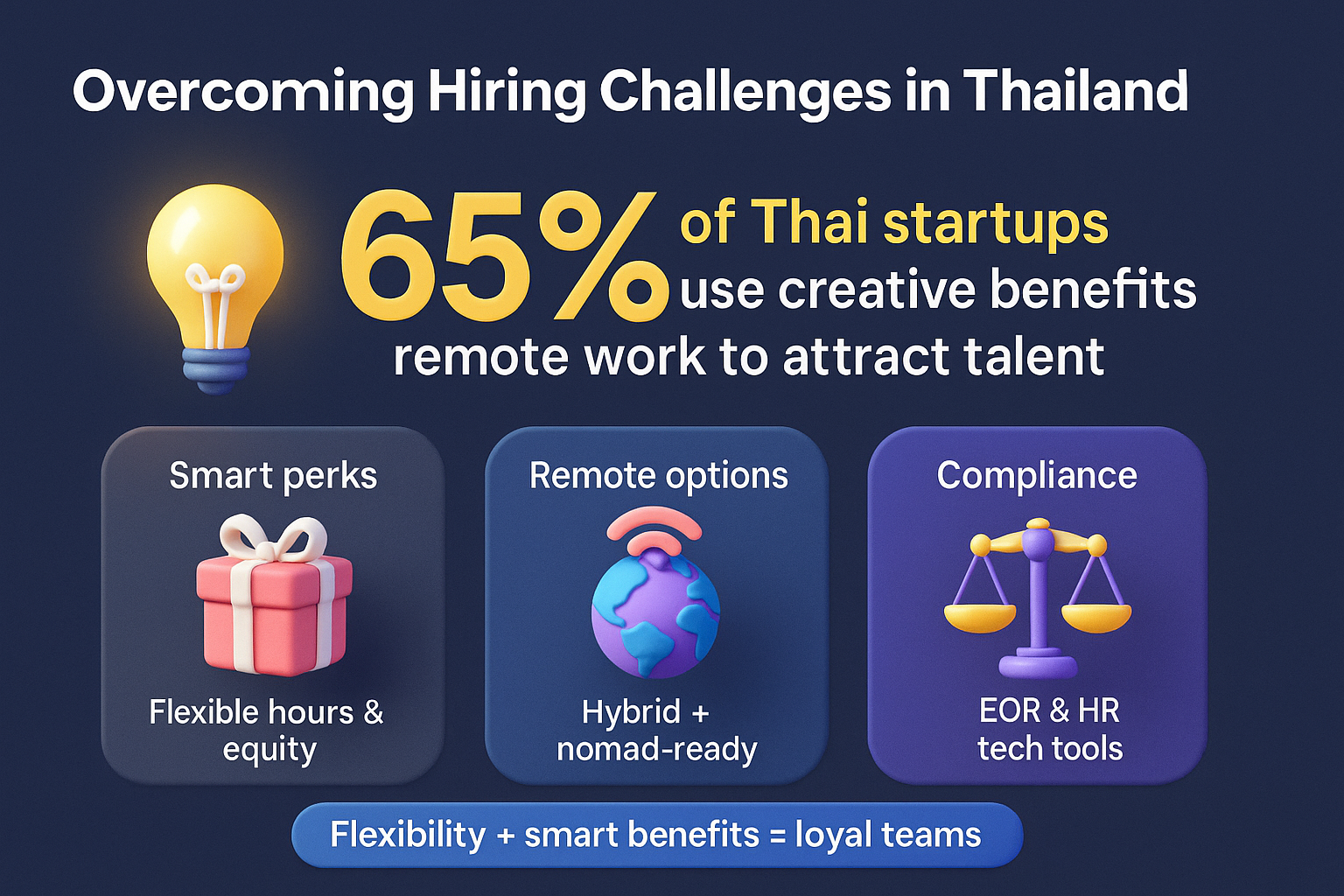
The Role of aboveA in Helping Startups Hire Smarter
Hiring in Thailand’s startup ecosystem is one of the most prominent challenges founders face in 2025. Competing against corporates with deep budgets, navigating labor laws, and attracting skilled talent in Bangkok or Chiang Mai requires more than just posting on job boards. This is where aboveA’s hiring and growth solutions for startups stand out. Unlike traditional recruitment agencies, aboveA delivers a complete startup-focused approach that combines hiring strategy, talent development, and growth support into one system.
aboveA’s Unique Edge in Thailand’s Startup Hiring Market
aboveA recognizes that every early-stage founder needs more than staff – they need a talent pipeline that fuels growth. That’s why the agency blends its incubator, academy, and capital programs into recruitment strategies. This ensures that Thai startups attract people who not only fill roles but also align with the long-term vision.
Full-Stack Talent Solutions for Startups
Instead of offering one-off recruitment services, aboveA helps startups:
Map out role requirements based on growth stage (Seed, Series A).
Access pre-trained candidates through the aboveA Academy, where individuals are upskilled in marketing, growth hacking, and digital tools.
Create scalable hiring models that start with freelancers or part-timers and expand to full teams as funding grows.
This approach is handy in Thailand, where founders often balance limited funding with ambitious expansion goals. By planning, startups can avoid mismatched hires that drain time and capital.
Employer Branding and Cultural Fit
One of aboveA’s biggest differentiators is helping startups build a strong employer brand in Thailand. In 2025, candidates expect more than salaries; they want vision, flexibility, and growth opportunities. aboveA coaches founders on showcasing company culture, promoting employee stories, and creating a compelling narrative that resonates with Thai professionals on LinkedIn, Glassdoor, and local job boards. This ensures cultural fit and reduces turnover.
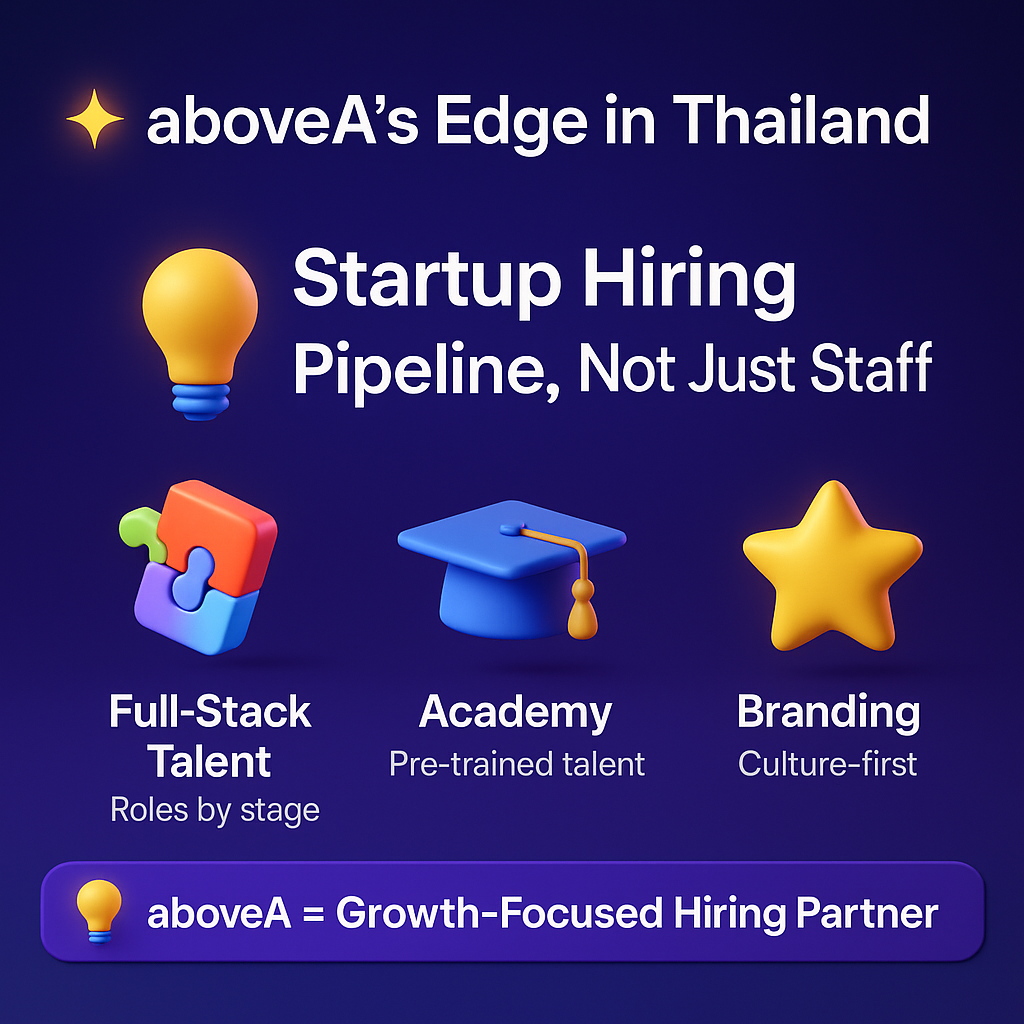
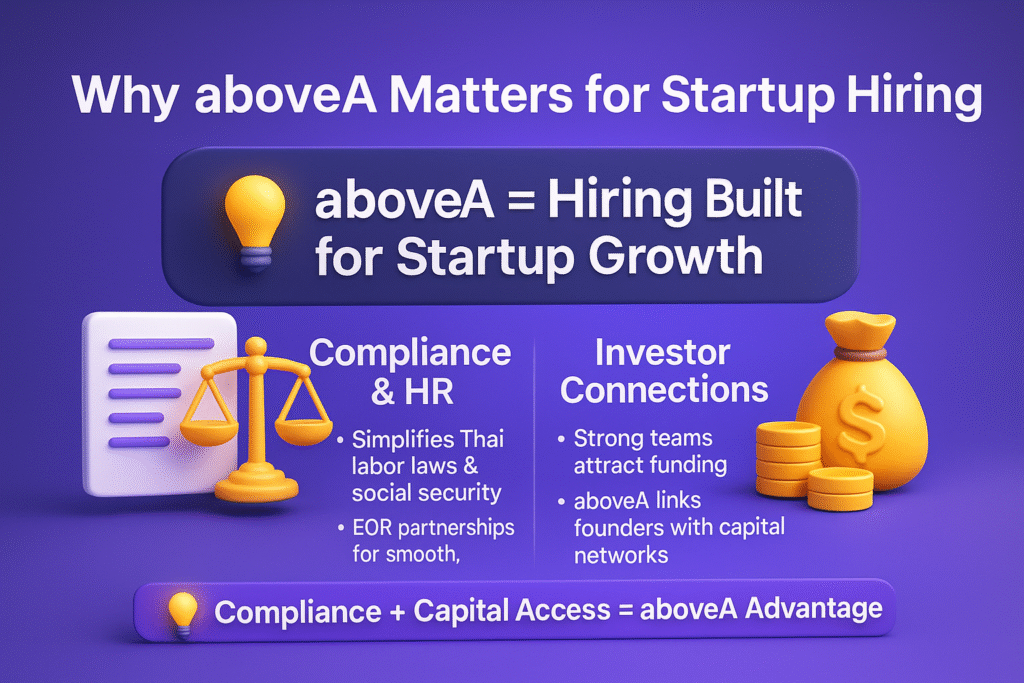
Why aboveA Outperforms Traditional Recruitment Agencies?
Unlike agencies that focus on filling seats, aboveA’s model ensures sustainable growth hiring. The agency views recruitment as a long-term growth lever, not a short-term transaction.
Compliance and HR Infrastructure Support
Thailand’s strict labor laws, social security requirements, and visa processes can overwhelm early-stage founders. aboveA simplifies this with compliance guidance and partnerships with Employer of Record (EOR) services. This allows startups to hire legally, onboard foreign talent, and avoid costly mistakes while staying lean.
Investor and Capital Connections
Investors in 2025 pay close attention to team quality. A startup with a strong, skilled, and stable team has a higher chance of securing funding. aboveA leverages its capital and incubator network to connect startups with investors who value well-structured hiring strategies. By aligning talent development with funding opportunities, startups can grow faster and reduce investor risk.
Why aboveA Is the Smarter Choice for Startups in 2025?
When compared to traditional recruitment firms in Thailand, aboveA offers a growth-first approach that integrates:
Talent strategy workshops that align hiring with product-market fit.
Pre-trained candidates through aboveA Academy.
Employer branding support to stand out in crowded job markets.
Compliance and payroll solutions to reduce operational risks.
Capital connections for scaling after successful hires.
For founders in Bangkok facing rising salary expectations, or for Chiang Mai startups competing with digital nomads, aboveA offers a localized, startup-centric hiring model that saves time, reduces costs, and builds stronger teams.
By choosing aboveA, Thai founders don’t just hire employees – they build a foundation for scalable growth that supports fundraising, international expansion, and long-term success.
Conclusion and Next Steps for Founders
Hiring talent in Thailand’s startup ecosystem is no longer about filling roles; it’s about building teams that accelerate growth. In 2025, founders must balance salary expectations, cultural fit, compliance, and investor confidence. By leveraging innovative recruitment strategies and partners like aboveA, startups can secure the right talent without wasting time or burning capital.
The next step for founders is clear: invest in employer branding, tap into trained talent pools, and choose scalable solutions that match your funding stage. With the right hiring approach, startups in Bangkok, Chiang Mai, and beyond can move faster toward customers, capital, and global opportunities.
Frequently Asked Questions
What makes startup hiring in Thailand different in 2025?
Hiring in Thailand is shaped by rising salaries, intense corporate competition, and regional differences. Startups must focus on employer branding, compliance, and flexible models to attract top talent.
How can startups compete with corporates for talent in Thailand?
Startups can win talent by highlighting career growth, equity incentives, flexible work models, and cultural fit. Employer branding and faster career progression often outweigh corporate salary packages.
Why should Thai startups consider aboveA for recruitment?
aboveA offers startup-focused hiring solutions, talent strategy workshops, academy-trained candidates, compliance support, and investor connections. This holistic approach goes beyond traditional recruitment agencies in Thailand.
What hiring strategies help Thai startups attract investors faster?
Investors value strong teams. Startups in Thailand can attract funding by showcasing skilled hires, cultural fit, scalable structures, and reduced turnover through strategic hiring and growth-aligned recruitment planning.

